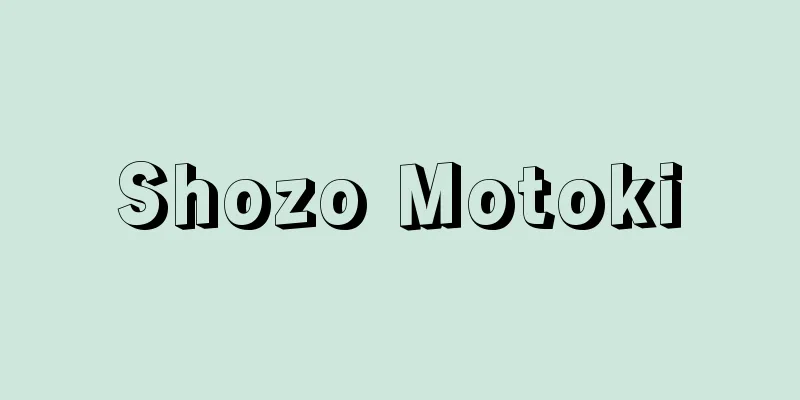Shozo Motoki

|
He was from Nagasaki. His pen name was Eikyu and he went by the name Goso. He was born as the fourth son of Kitajima Miyata and inherited his mother's family, the Motoki family, who were Dutch interpreters. As part of his family business, he was interested in Western mechanical technology, especially printing and type manufacturing, and in 1851 (Kaei 4) he printed his own book, "Dutch and Japanese Interpretation," on a printing press imported from the Netherlands. He later worked as an interpreter for the Russian envoy Putyatin in Izu Toda, where he was involved in the construction of a Russian ship, and became an interpreter at the Shogunate's Nagasaki Naval Training School, where he learned about navigation and ironworking. In 1860 (Man'en 1), he was appointed as an official at the Edo shogunate's Nagasaki Akunoura Ironworks (now the Mitsubishi Heavy Industries Nagasaki Shipyard), and later became its president. He erected the Nishinohama Iron Bridge, and during that time he was involved in a wide range of activities, including importing a steamship and sailing it as its captain in 1861 (Bunkyu 1). In 1869 (Meiji 2), he established a typography training school within the premises of the same ironworks, and welcomed the American missionary William Gamble (?-1886) from Shanghai, where he succeeded in casting metal type. The following year, in 1870, he resigned as president and established a typography shop in Shinmachi, Nagasaki, where, together with his disciples Hirano Tomiji and Yosonji (1838-1906), he paved the way for the development of printing technology in modern Japan. Among his memorable achievements were the rational system of various large and small metal type known as Ming type, the introduction of the beauty of Japanese calligraphy into type, and the opening of the New Nagasaki School by allocating profits from the printing industry to nurture new citizens. [Kenichi Iida] "The Dawn of Printing Culture - The Life of Shozo Motoki" by Shiro Shibata (1954, Japan Printing Newspaper Company) [References] | | | | |Source: Shogakukan Encyclopedia Nipponica About Encyclopedia Nipponica Information | Legend |
|
長崎の人。字(あざな)は永久、梧窓(ごそう)と号した。北島三弥太の四男に生まれ、母の実家、オランダ通詞の本木家を継ぐ。家業がら、西洋の機械技術、ことに印刷、活字製造に興味をもち、1851年(嘉永4)自著『蘭和通弁(らんわつうべん)』をオランダ輸入の印刷機で印刷している。その後ロシア使節プチャーチンの通訳として伊豆戸田(へだ)でロシア艦の建造に関係し、幕府の長崎海軍伝習所通訳となったことから航海、製鉄術を習得した。1860年(万延1)幕府の長崎飽ノ浦(あくのうら)製鉄所(現在の三菱(みつびし)重工長崎造船所)御用掛に任命され、のちには頭取となり、西ノ浜鉄橋を架設し、その間1861年(文久1)には蒸気船を輸入し自ら船長として航海するなど、幅の広い活動をした。1869年(明治2)同製鉄所構内に活版伝習所を設け、上海(シャンハイ)からアメリカ人宣教師ウィリアム・ガンブルWilliam Gamble(?~1886)を迎えて、金属活字の鋳造に成功した。翌1870年頭取を辞任し、長崎新町に活版所を創設、門下の平野富二、陽其二(ようそのじ)(1838―1906)らとともに近代日本の印刷技術発展の道を開いた。明朝活字(みんちょうかつじ)といわれる大小各種金属活字の合理的なシステム、活字への日本の書のもつ美しさの導入、また印刷業の利潤を割いての長崎新塾開設による新しい市民の育成などは記念すべき業績である。 [飯田賢一] 『柴田四郎著『印刷文化の黎明――本木昌造の生涯』(1954・日本印刷新聞社)』 [参照項目] | | | | |出典 小学館 日本大百科全書(ニッポニカ)日本大百科全書(ニッポニカ)について 情報 | 凡例 |
Recommend
Nakamura Nakazo
Kabuki actor. First World (1736-90). Stage name: ...
experiment
...Therefore, in order to verify a hypothesis tha...
Urology - Urology
It is a branch of clinical medicine and is a rela...
Eusebio de Queiroz Method - Eusebio de Queiroz Method
… In the first decade of his 50-year reign, rebel...
hof
...Iceland is a society that was created by immig...
Ikoma Raiyu
1895-1964 A narrator and stage actor from the Tai...
Cortinarius venenosus (English spelling) Cortinariusvenenosus
…[Rokuya Imaseki]. . … *Some of the terminology t...
Tomoyoshi Yamairi
?-1422 A military commander of the Muromachi peri...
God of Occupation
People earn a living by doing various jobs, and se...
de Broglie wave (English spelling) deBrogliewave
…Similarly, protons and neutrons are not mass poi...
"Life of an American Firefighter" - The Life of an American Firefighter
… [What is American cinema?] The beginning of Ame...
knucklebones
…Marbles [Toshiro Hanzawa] [Similar examples in f...
Baring Brothers & Co. Ltd.
The oldest merchant bank in the UK. Headquartered ...
Cyclorrhapha
…When they emerge, the puparium splits vertically...
Yuan Huang Kun Yi - Yuan Huang Kun Yi
...A Chinese thinker in the late Ming Dynasty. Hi...









